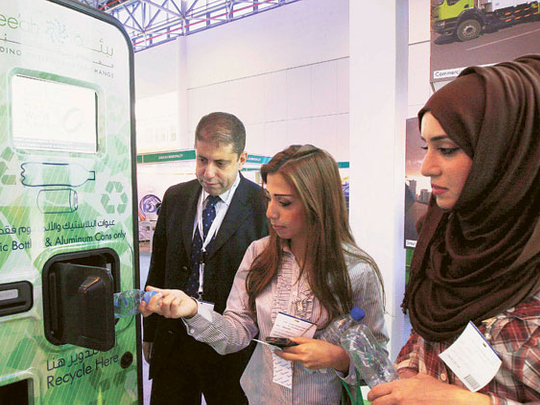
Sharjah: In four years, waste could be a thing of the past in Sharjah with all recyclables sorted and reused, organic waste composted and nothing at all going to landfills.
Sharjah's "Zero Waste" plan by 2015 was announced Monday by Bee'ah, the emirate's waste management company, at Green Middle East expo taking place until Wednesday.
The task means dealing with the 23,000 tonnes of municipal waste collected by Bee'ah every month and sorted or dumped at the Al Saj'ah landfill site. Since the beginning of this year, 34 per cent of that waste has been recycled, said Khalid Al Huraimel, Chief Executive Officer at Bee'ah.
To reach the goal, Dh100 million has been invested to deploy improved blue and green, odour-proof, scavenger-resistant bins all over Sharjah by 2012.
New equipment
New collection vehicles, bin washers, bin side-loaders and street cleaners have also been brought in from Europe for higher efficiency and better collection operation throughout the streets of Sharjah.
Residents will be able to throw recyclable waste such as paper, cardboard, glass, plastics or aluminium into a blue single container and all other general waste into a green container.
"It's clear that zero-waste is the way forward. The most sustainable countries in the world are already implementing best practices and technology to attain zero-waste," said Salim Al Owais, Chairman of Bee'ah.
Technology
Solutions to deal with the mountain of waste will include waste to energy technology, organic composting and metal recycling.
"Internationally, this type of recycling programme has worked tremendously well, resulting in more recyclables taken out of the general waste stream and the quantity of recyclables increasing, while residual waste decreases," said Al Huraimel.
The lack of well-enforced environmental legislation continues to mar the industry's clean up efforts.
Landfill for importers
"Unfortunately there are no rules or legislation to protect the environment from imports into the country. Sharjah has become the landfill for importers. They bring equipment that they can't recycle in other countries here. This should be stopped," said Salim Al Owais, Bee'ah Chairman.
Business opportunities abound in the waste management sector in the UAE, he said. "We don't look at it as a business when the environment has been damaged… but there is huge potential for business."
Al Owais believes privatisation of waste management — traditionally the domain of municipalities — is the way to go in the UAE.
Government of Holland
The Dutch government is providing consultancy to Bee'ah on ways to reduce waste production as the UAE has the highest amount of waste per capita, Al Owais said.
Keynote speaker at the forum, Ebrahim Abdul Matin, policy advisor for long-term planning and sustainability at the office of the mayor of New York city, said the US city of nearly eight million people has its own goals to divert 75 per cent of its waste from landfills by 2030.
"This demands behaviour change because we actually need to use less," he said. "If people change their behaviour than the government can change but governments needs to make the rules."
Three facilities
Bee'ah, a Sharjah-based waste management company was set to sign Tuesday a €500 million (Dh2.58 billion) deal with the Dutch government to develop facilities on build, operate and transfer (BOT) basis to help Sharjah become a zero-waste emirate by 2015, a top official told Gulf News.
Bee'ah will manage three facilities for e-waste, waste-to-energy and compost that the Dutch government will operate for a limited time, said Salim Al Owais, Bee'ah Chairman. The period is yet to be determined.
Bee'ah's total investments to date reach Dh800 million in waste disposal plants in Sharjah, he said. It was founded in 2007 as a public-private partnership with Sharjah Municipality. The household waste plant has been established at a cost of Dh220 million and the tyre recycling facility is worth Dh180 million, Al Owais said.
The construction and demolition waste recycling facility at Al Saja'a is worth Dh75 million and the medical waste plant Dh25 million, he added.












